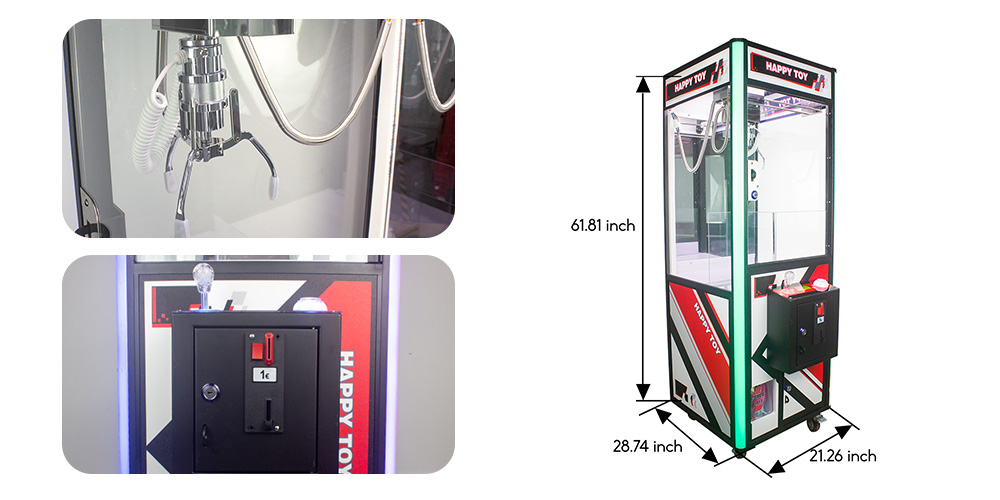In China, operating a claw machine requires obtaining relevant licenses. First, businesses must apply for a business license to ensure their business scope includes entertainment equipment. Additionally, some regions require a cultural business license. The equipment must also comply with fire safety regulations and undergo quality certification. According to 2022 data, China’s claw machine market size reached 15 billion RMB, and about 20% of operators had not obtained the necessary licenses. Legal operation requires first registering a company, obtaining cultural and fire safety licenses, and coordinating with local regulatory authorities to ensure compliance with specific requirements. This not only ensures legal operation but also enhances consumer trust.
Table of Contents
ToggleDoes Operating a Claw Machine Require a License
According to Chinese laws and regulations, claw machines, as a type of equipment in entertainment venues, must adhere to relevant regulatory policies. First, businesses wishing to operate claw machines in public spaces must have a valid business license. The business license is the most basic requirement, ensuring that the business’s activities are legal. This license is not only for registering a company but must also clearly define the business scope, including whether it covers entertainment or amusement equipment operations.
Some regions require businesses to apply for a cultural business license. According to the “Regulations on the Administration of Entertainment Venues,” claw machines may fall under the category of amusement equipment, involving cultural operations, thus requiring a license from the local cultural department. The issuance of this license is primarily to ensure the standardized management of entertainment facilities and to ensure content is healthy and safe.
In addition to the cultural business license, businesses also need to obtain a fire safety permit. Claw machines are usually placed in high-traffic areas, such as shopping malls and cinemas, so the fire safety of the machines and the surrounding environment is crucial. Businesses must ensure that the installation of the machines does not pose a fire hazard. The fire department will conduct a site evaluation to ensure that the location meets national fire safety standards.

Why Does the Operation of Claw Machines Require Regulation
Although claw machines may seem like simple entertainment devices, they are closely related to consumer rights, safety, and public order. Consumer rights are the primary focus of regulation. Many claw machine devices can adjust the level of difficulty to affect the player’s success rate. If operators do not set the machines according to standards, consumers may suffer losses, even leading to an unfair gaming experience. According to some consumer protection associations, over 60% of consumers have expressed doubts about the fairness of claw machine games. Therefore, the government has enacted regulations to ensure that the machines are operated in a transparent and fair manner.
The safety of the devices is another key aspect of regulation. Claw machines are often installed in public spaces like shopping malls or amusement parks, where there is heavy foot traffic. If the equipment poses a safety risk, it could endanger those nearby. For instance, if the machine’s wiring is outdated or incorrectly set up, it could lead to electrical short circuits or fires. According to the fire department, in 2020, fires caused by entertainment equipment accounted for 2.3% of all fire incidents in China. Although the proportion is small, these potential hazards must still be taken seriously. Strict regulation helps reduce these safety risks and ensures public safety.
Maintaining market order is another important task. As the claw machine market rapidly expands, many unlicensed operators have entered the market. Due to the lack of regulation, these operators may lower service quality or adjust machine fairness, disrupting market order. Data shows that in 2021, over 20% of claw machine operators nationwide did not obtain the necessary business licenses, leading to disorganized market competition. Therefore, the national and local governments have implemented a licensing system to ensure that operators in the market are qualified, thereby maintaining a fair competitive environment.

How to Legally Operate a Claw Machine
For businesses looking to legally operate claw machines, the first step is to obtain a business license. By registering a company and defining the business scope to include entertainment equipment operations, this is the basic step for legally running a business. Businesses also need to pay attention to the cultural policies of different regions. If claw machines are classified as cultural business equipment, businesses must apply for a cultural business license. This process usually involves approval from the local cultural department, including reviewing the nature of the equipment, the mode of operation, and content inspection.
The operating venue must comply with fire safety standards. Claw machines are often installed in high-traffic public areas, and the fire department will evaluate the site to ensure that the placement of the machines does not block fire exits or pose potential fire hazards. Businesses need to cooperate with the local fire department to ensure all equipment complies with relevant safety regulations.
Quality certification of the equipment is another aspect businesses must focus on. To ensure the safe operation and fairness of claw machines, the state has established clear technical standards for this type of equipment. Businesses need to ensure that the claw machines they use meet national quality standards, and if necessary, they can request third-party testing agencies to certify the quality of the equipment. This not only ensures operational safety but also increases consumer trust.




